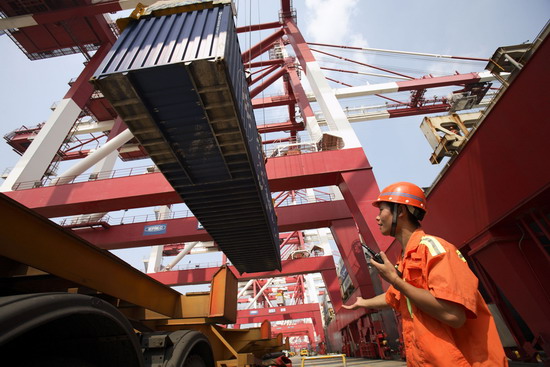Trade surplus falls, FDI high
Updated: 2007-10-13 09:29

|
|
A dock worker directs a container onto a truck at the Qingdao Port in Shangdong Province. China's trade surplus dropped in September from the previous month to US$23.9 million. [China Daily] |
The trade surplus dropped in September from the previous month on the country's macroeconomic control policies, but foreign direct investment (FDI) remained high, according to official figures.
The nation chalked up a trade surplus of US$23.9 billion in September, up 56 percent from a year earlier, but lower than August's US$25 billion, the General Administration of Customs said on Friday.
The country has been trying to cut its trade surplus by reducing export tax rebates and encouraging high-tech and materials imports.
Year-on-year surplus growth in the third quarter was 50.4 percent, much lower than the 75.4 percent year-on-year growth of the second quarter.
"It is still not the time to expect China's trade surplus to decline in volume," said Mei Xinyu, a trade researcher with the Chinese Academy of International Trade and Economic Cooperation. "But the policies will lead to a decrease in the growth rate."
He expects the country's trade surplus will total US$250 billion for the whole year, with the monthly figure "likely to decline month by month".
The year-on-year growth rate of the trade surplus has softened in recent months, which could potentially bring down GDP growth in the third quarter, Goldman Sachs Asia Economics Research Group said in a research note.
The September figure took the surplus for the first nine months to US$185.65 billion, up 69 percent from US$109.85 billion in the same period last year.
The country's imports and exports totaled US$1.57 trillion in the first nine months, up 23.5 percent from a year earlier.
In another development, China's actual FDI increased some 10.87 percent year-on-year to US$47.22 billion in the first three quarters this year, according to the Ministry of Commerce.
The ministry approved 28,206 foreign-invested companies from January to September, down 6.05 percent from the same period last year.
From the beginning of 2008, China will unify income tax rates for domestic and foreign companies at 25 percent. Domestic companies currently pay 33 percent income tax, while foreign companies, which benefit from tax waivers and incentives, pay an average of 15 percent.
|
|